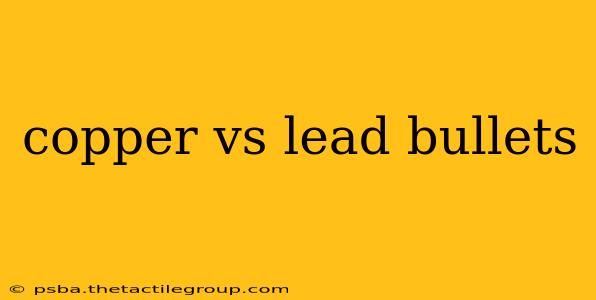Choosing the right ammunition is crucial for any hunter or shooter, and the debate between copper and lead bullets often arises. Both offer distinct advantages and disadvantages, making the "best" choice highly dependent on individual needs and priorities. This in-depth comparison will explore the key differences, helping you make an informed decision.
Key Differences Between Copper and Lead Bullets
The fundamental difference lies in the material: lead is a dense, soft metal, while copper is harder and more durable. This core distinction impacts various performance aspects.
Density and Ballistic Coefficient
-
Lead: Lead's high density contributes to its impressive stopping power at shorter ranges. However, it generally has a lower ballistic coefficient (BC), meaning it's more susceptible to wind drift and loses velocity faster over distance.
-
Copper: Copper, while less dense than lead, often boasts a higher BC. This translates to better long-range accuracy and less wind deflection. However, achieving the same stopping power may require a larger diameter or heavier bullet.
Expansion and Fragmentation
-
Lead: Lead bullets typically rely on deformation and expansion upon impact to inflict damage. The softness of lead allows it to mushroom effectively, transferring energy to the target. However, this expansion can be inconsistent depending on velocity and target material.
-
Copper: Copper bullets, particularly those designed with monolithic or bonded construction, are known for their consistent expansion and controlled fragmentation. They are designed to retain their weight and shape better, ensuring deeper penetration and reliable performance across a wider range of velocities and target types.
Environmental Impact
-
Lead: Lead is a known neurotoxin, raising significant environmental concerns regarding its use in ammunition. Lead fragments in the environment pose risks to wildlife and humans. Regulations regarding lead ammunition are increasingly common, particularly in hunting areas.
-
Copper: Copper is considered a more environmentally friendly alternative. While it's not entirely without environmental impact, its toxicity is significantly lower than lead's, making it a more sustainable choice for many.
Cost
-
Lead: Generally, lead bullets are significantly less expensive than copper bullets. This cost difference can be substantial, especially for high-volume shooters or hunters.
-
Copper: The manufacturing process for copper bullets is more complex and often involves more expensive materials, resulting in a higher price point.
Applications: Where Each Excels
Lead bullets remain a popular choice for:
- Short-range hunting: Where stopping power is prioritized over long-range accuracy.
- Target shooting: Cost-effectiveness is a key factor in high-volume practice.
- Certain handgun applications: Where bullet expansion is crucial at shorter ranges.
Copper bullets are preferred for:
- Long-range hunting: Where accuracy and trajectory are paramount.
- Hunting in areas with lead restrictions: Compliance with environmental regulations is essential.
- Situations requiring deep penetration: Maintaining bullet integrity is crucial.
- Varmints and small game hunting: Their superior accuracy at long-range distances often prove useful.
Conclusion: The Best Choice Depends on Your Needs
Ultimately, the "better" bullet – copper or lead – depends entirely on your specific needs and priorities. Consider the hunting or shooting discipline, range, target, environmental concerns, and budget when making your selection. Understanding the advantages and disadvantages of each material allows for a well-informed decision that optimizes performance and aligns with ethical and environmental considerations.

